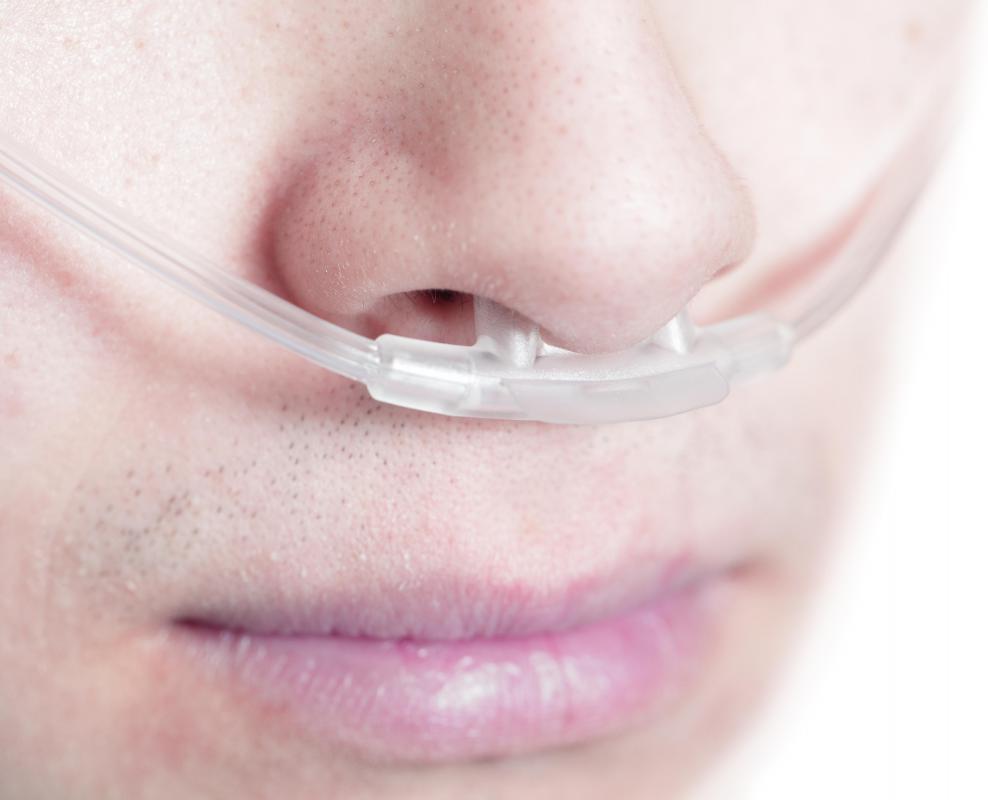At TheHealthBoard, we're committed to delivering accurate, trustworthy information. Our expert-authored content is rigorously fact-checked and sourced from credible authorities. Discover how we uphold the highest standards in providing you with reliable knowledge.
What Are the Potential Complications of Chronic Hypoxemia?
Hypoxemia is a medical condition that occurs when the body cannot get enough oxygen. Chronic hypoxemia is when the body has long periods of low blood oxygen levels in the arterial blood. The condition generally occurs when a person has anemia, a primary hemoglobin deficiency or a lung disease. Potential complications of chronic hypoxemia include pulmonary hypertension — increased blood pressure in the lungs — impaired brain function, heart attack, hypoxia and secondary polycythemia.
High blood pressure in the lungs resulting from chronic hypoxemia is caused by low oxygen levels in arterial blood, which may be caused by the smaller blood vessels narrowing and preventing the normal volume of blood from flowing through them. When blood pressure in the arteries of the lungs — the pulmonary arteries — is higher than normal, it raises the blood pressure in the heart's right ventricle. This forces the heart to work harder to pump the blood, which can lead to heart tissue damage. Over time, chronic hypoxemia can continue to damage heart tissue until the damage becomes so great that it causes the right side of the heart to fail, which causes a heart attack.

Just like other organs in the body, the brain requires a steady supply of oxygen to work properly. When the brain is starved of oxygen during chronic hypoxia, it may cause a person to have poor judgment and a loss of coordination. Loss of oxygen to the brain also may cause euphoria, or an intense feeling of happiness, elation, excitement and well-being.

When the cells of the body are starved of oxygen because of chronic hypoxemia, it may cause hypoxia. Hypoxia is an overall low blood oxygen level that can affect the entire body — at which point it is called generalized hypoxia — or a region of the body — known as tissue hypoxia. It can cause headaches, fatigue, shortness of breath, nausea and, in extreme cases, loss of consciousness, coma, seizures, priapism, cyanosis and death.

Secondary polycythemia is the name given when the bone marrow makes too many red blood cells in response to low levels of oxygen in the blood. Low oxygen levels cause a high production of erythropoietin (Epo), a type of enzyme made by the kidneys and liver. The enzyme enters red bone marrow and causes it to start making red blood cells in a process called erythropoiesis. Red blood cells carry oxygen in the blood, so more red blood cells are made in the body's attempt to raise blood oxygen levels. Common symptoms of secondary polycythemia are dizziness, shortness of breath, fatigue or physical weakness, chronic cough and sleep apnea.
AS FEATURED ON:
AS FEATURED ON:
















Discuss this Article
Post your comments